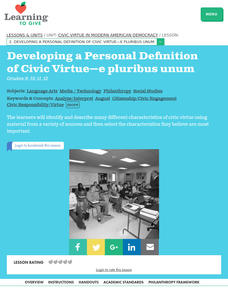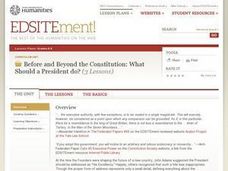Judicial Learning Center
The Federalist Papers and The Federal Judiciary
Pupils work in groups or as individuals to read about and then discuss the Federalist Papers. To finish, they write essays about an assigned topic dealing with the Federalist Papers and the federal judiciary.
National Endowment for the Humanities
Chief Executives Compared: The Federalist Papers
Delve into the responsibilities of the president by looking at President Hamilton's opinion of the presidential office in his own words. The second in a three-part series, the resource also offers an interesting compare-and-contrast...
Curated OER
The Federalist Papers
What were The Federalist Papers? If you're preparing your class for a quiz on this topic, consider providing them with these thought-provoking study questions. Ten questions are provided, although only three contain possible answers.
Reading Through History
Anti-Federalist Paper No. 3
Who were the Anti-Federalists and what do primary sources tell young historians about their beliefs? Learners read Paper No. 3 to understand their values in relation to government, such as their discussion on foreign policy and the pros...
Reading Through History
Anti-Federalist Paper No. 47
The path to a more perfect union was rockier than most history books would lead you to believe. Young historians read “Antifederalist No. 47,” written by James Madison (under the pen name “Centinel”), which sharply criticizes the...
National Endowment for the Humanities
Lesson 2: Chief Executives Compared: The Federalist Papers
Fix the Articles of Confederation or develop a new constitution? That was the question facing the Founding Fathers. Several of those in favor of a new constitution published a series of essays, collected in the Federalist Papers, urging...
National Endowment for the Humanities
Ratifying the Constitution
Ratifying the Constitution was no simple task. Using primary sources, such as classic writings from the Federalists and Anti-Federalists, young scholars examine the arguments for and against the Constitution. They then decide: Would they...
Curated OER
Introducing the Essay: Twain, Douglass, and American Non-Fiction
Students analyze American essayists Mark Twain and Frederick Douglass in an introduction to American literary non-fiction writing. In this essay history lesson, students identify methods for writing essays. Students read and analyze...
Curated OER
Why a Bill of Rights? What Impact Does it Have?
Students explore the Bill of Rights. In this Bill of Rights lesson, students compare the Federalist view of government to the Anti-Federalist view of government. Students consider the impact of the bill of rights as they take notes on...
Curated OER
Civic Virtue in Democracy
Students identify and describe characteristics of civic virtue. Following a class discussion, they create their own definitions of civic virtue. They write essays based on their own definitions and formulate conclusions on the state of...
Curated OER
Before and Beyond the Constitution: What Should a President Do?
Students discuss the powers and responsibilities of the President, list some precedents established during Washington's presidency, and match presidential actions with the type of Executive power it is.












